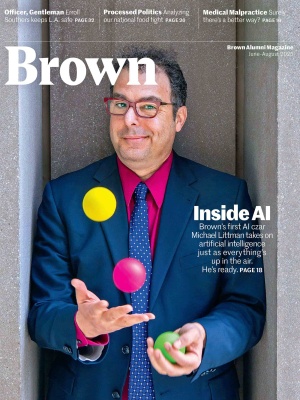For years both before and after she went to law school in 2006, Anne Tamar-Mattis ’91.5 worked in jobs that put her close to people’s depression, anxiety, and trauma. In the ’90s, she ran a hotline for LGBTQ youth and volunteered for another for rape crisis. Post-law school, she started the first advocacy nonprofit for the intersex community and then ran an organization that helps people resolve divorce conflict out of court. “I intended for it to be my retirement job,” she says.
But then she started hearing from her spouse of 27 years, Dr. Suegee Tamar-Mattis, the remarkable tales of healing that Suegee was witnessing as medical director for Liminal Medicine, a so-called “integrative healing center” north of San Francisco that offers psychotherapy assisted by the legal psychedelic ketamine. The drug has long been medically available as an anesthetic, but much-publicized recent research has also shown that it can have remarkable effects on depression and PTSD when administered in a therapeutic setting.
Suegee told, for example, of a patient who had long been addicted to methamphetamine who, during a ketamine-assisted psychotherapy (KAP) session, experienced meth as a longtime harmful lover he was breaking up with. He has since stayed off meth, she says. Anne, who says she’s been treated all her life for depression with both antidepressants and therapy, did her own KAP sessions—and, she says, experienced a “deep revelation,” a remarkable sort of inside-your-own-movie immersion, that allowed her to realize that her two adult children would be okay on their own and that she could let go of some of her long-held parental anxiety.
She was so struck by the power of KAP that she left her job, becoming the administrative director of Liminal. “I do everything that doesn’t require a medical or therapy license,” she says, “from answering phones to ordering things to being chief corporate counsel and compliance officer. It’s helpful to have a lawyer around.”
Services are not covered by insurance and cost hundreds to thousands of dollars depending on the package. Tamar-Mattis says that Liminal is committed to finding ways to offer its services to low-income individuals or communities who could benefit from it, such as some pro bono work and a fund people can donate to to subsidize sessions for non-wealthy clients.
She says it’s rewarding to be at the center of a growing field that offers such promise. “This is really the first new hope that’s come around in many decades in addressing trauma at its source. I see this as having the potential to intervene in cycles of family violence and community trauma,” she says.






